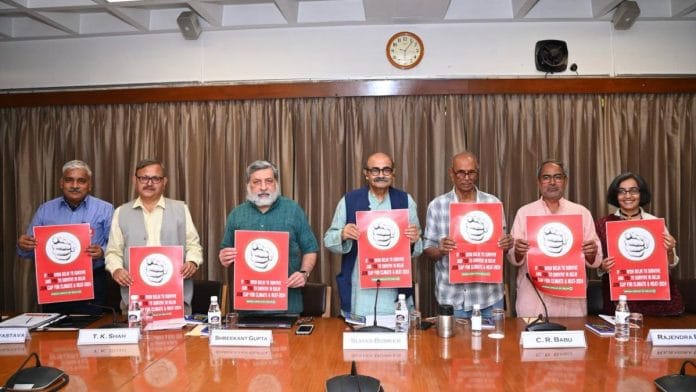New Delhi: Documentary filmmaker and green activist Suhas Borker makes his way around a conference room at India International Centre, holding a bunch of posters and distributing stickers, urging citizens to take action “if they want Delhi to survive”. He is one of the founders of the Green Circle of Delhi, a volunteer group started in 1992 to protect Delhi’s green spaces. Now, the group has come together for the first time in its 32-year history to launch the Citizens’ Action Plan for Climate and Heat in Delhi. It’s a plan for the people, by the people of Delhi.
“We are heavily in campaign mode now, after months of drafting this plan,” said Borker at the launch event at IIC on 9 April. The Citizens’ Climate and Heat Action Plan (CAP) is a document divided into six areas, all dealing with different sectors through which the adverse effects of heat and climate change can be tackled at the city level.
From harvesting rainwater to constructing pedestrian walkways, the CAP has multiple recommendations. One of the tenets of the action plan is food sovereignty, and the need for Delhi to be self-sustainable in food production and growth.
“This plan is an answer to a crisis,” said Borker, and it relies entirely on the citizens of Delhi to make it a success.
Also read: Election fever & extreme heat alert—state govts yet to learn from Kharghar deaths
Looming threat of climate change
Rising temperatures and heatwave warnings across the country have given an impetus to the volunteers of this civil society group. The Delhi government’s Heat Wave Action Plan is yet to be implemented, but that doesn’t mean that citizens have to take a back seat.
Green Circle of Delhi was founded at Lodhi Gardens, one of the oldest public parks in the city. For the past 32 years, its volunteers have organised sessions and workshops to educate residents on the importance of protecting green spaces, keeping public places clean and not bursting crackers among other initiatives.
However, the looming threat of climate change made Borker and other volunteers, well in their 60s and 70s, realise they must act fast. They assembled a team of experts on environment and climate studies — academics such as CR Babu and Shreekant Gupta, former civil servants like TK Shah, and entrepreneurs such as Yogita Shukla—to help draft a climate action plan that would be comprehensive enough to tackle Delhi’s climate crisis.
Gupta, a former professor at the University of Delhi, drew examples from his own surroundings to show how the capital had changed over the years. “The Delhi University campus where I have been teaching for decades, the Aravallis near Gurgaon – I have personally seen these places lose their green cover over time and be destroyed,” he said. “All of Delhi’s citizens need to undertake massive tree plantation to bring our tree cover back where it used to be.”
The IIC event began with the launch of a book titled Exploring New Urbanism–Food, Farm and Wastelessness by Rajendra Ravi, a panellist and one of the writers of the CAP. This release aligned with Ravi’s discussions on the importance of self-sufficiency in Delhi’s food production for achieving future climate change mitigation goals.
“You might think this action plan looks at too many varied issues but let me tell you it is all interconnected and ties back to climate change. This existential crisis can only be addressed if we take action on all fronts,” said Ravi.
Also read: CEEW to iFOREST, Modi govt listens when think tanks talk. They are growing in clout & cash
Students are the best hope
Measures such as banning the sale and use of diesel generators, providing incentives for eco-friendly buildings, and improving public transport connectivity—all need to be implemented by the state. However, at the outset, Borker announced to the largely male audience that Green Circle of Delhi does not have political or social affiliations, and is an entirely voluntary group.
Their campaign model for the new action plan was to spread it to those who would best help with its propagation – students. “Green Circle already has initiatives where we have worked with school children, in programmes like Taking Children to Gandhi, which we host at IIC. The kids are our best hope, and that is our focus with the climate action plan,” Borker later told ThePrint.
Regarding other measures, the Green Circle is relying on the participation of citizens of Delhi like it has been for the past 32 years.
“We (Green Circle team) were all 30-year-olds when we started this initiative, and it brought together everyone–from judges to civil servants to activists,” said Borker.
Some of the suggestions made at the event were—adopting electric vehicles, organising massive tree plantation exercises, and using different construction methods to prevent heat-trapping in homes.
“It is something as simple as painting or whitewashing the roof of your house that would keep you cool during the scorching heat and all of us can adopt it in our homes without anyone’s help,” explained Yogita Shukla, one of the panellists.
As the audience members were leaving the venue, they were greeted by a volunteer of Green Circle of Delhi who offered them a sapling to take home. “Just planting this would be your first step toward protecting Delhi.”
(Edited by Ratan Priya)






